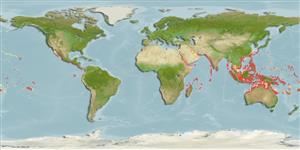Environment: milieu / climate zone / depth range / distribution range
Ecology
Marine; reef-associated; depth range 1 - 40 m (Ref. 9710), usually 10 - 25 m (Ref. 27115). Tropical; 24°C - 28°C (Ref. 27115); 30°N - 23°S, 180°W - 180°E
Indo-Pacific: Red Sea south to East London, South Africa (Ref. 5469) and east to the Marquesan Islands, north to the Mariana Islands, south to New Caledonia. Eastern Pacific: Gulf of California to Colombia and the Galapagos Islands (Ref. 9289).
Size / Weight / Age
Maturity: Lm ? range ? - ? cm
Max length : 10.0 cm TL male/unsexed; (Ref. 9289)
Dorsal spines (total): 10; Dorsal soft rays (total): 12 - 13; Anal spines: 3; Anal soft rays: 6. Highly variable in color from pale with grey to black blotches to pink with bright red blotches (Ref. 48636). Pale with horizontal rows of subquadrate dark brown spots; a row of smaller spots on LL between larger spots; small dark brown spots on head (Ref. 5469).
Inhabit areas of rich coral growth and clear water of lagoon, channel, or seaward reefs from below the surge zone to depths of at least 40 m. They rest on, in, or beneath hard or soft corals. Feed on crustaceans and small fishes (Ref. 37955). Males are territorial and haremic (Ref. 37816).
Life cycle and mating behavior
Maturities | Reproduction | Spawnings | Egg(s) | Fecundities | Larvae
Pelagic spawner (Ref. 31569). Spawning ascents into the water column occurred over a distance of 0.3 to1.0 m (Ref. 26305).
Randall, J.E., G.R. Allen and R.C. Steene, 1990. Fishes of the Great Barrier Reef and Coral Sea. University of Hawaii Press, Honolulu, Hawaii. 506 p. (Ref. 2334)
IUCN Red List Status (Ref. 130435)
Threat to humans
Harmless
Human uses
Fisheries: commercial; aquarium: commercial
Tools
Special reports
Download XML
Internet sources
Estimates based on models
Preferred temperature (Ref.
123201): 23.2 - 25.9, mean 24.9 °C (based on 42 cells).
Phylogenetic diversity index (Ref.
82804): PD
50 = 0.5039 [Uniqueness, from 0.5 = low to 2.0 = high].
Bayesian length-weight: a=0.01380 (0.00661 - 0.02881), b=3.02 (2.83 - 3.21), in cm total length, based on LWR estimates for this species & (Sub)family-body (Ref.
93245).
Trophic level (Ref.
69278): 4.0 ±0.66 se; based on food items.
Fishing Vulnerability (Ref.
59153): Low vulnerability (10 of 100).
Nutrients (Ref.
124155): Calcium = 99.4 [46.9, 167.8] mg/100g; Iron = 0.709 [0.395, 1.222] mg/100g; Protein = 18.6 [17.3, 19.8] %; Omega3 = 0.134 [0.076, 0.233] g/100g; Selenium = 24.7 [12.4, 52.0] μg/100g; VitaminA = 118 [34, 432] μg/100g; Zinc = 1.52 [1.00, 2.24] mg/100g (wet weight);
